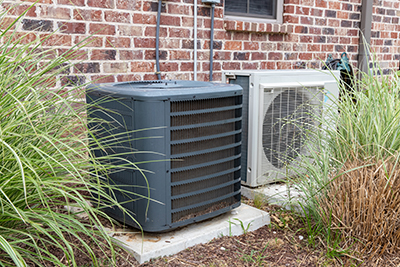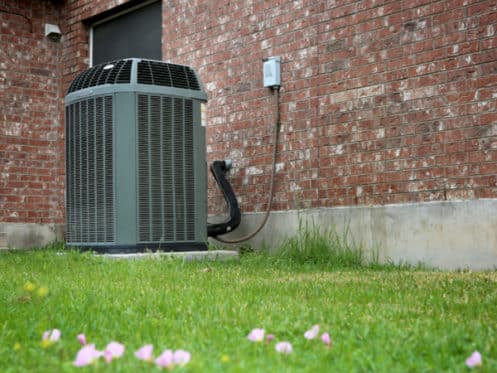Updated: January 2024
Whether you’re looking for a heat pump or a furnace for your home, our team at Affordable Air & Heating can provide the services you need. Our service area includes Lancaster, CA and the surrounding areas, and we’re experts when it comes to the nuances distinguishing heat pumps and furnaces.
Cooling systems typically use a compressor, condenser, expansion valve or coil, and an evaporator to refrigerate air and then circulate it through the environment. Air conditioners and heat pumps both use this basic refrigeration cycle. In cooling mode, the air conditioner transfers heat from the indoor air to the outdoor air. In heating mode, the heat pump reverses the flow of refrigerant and transfers heat from the outdoor air to the indoor air.
While a furnace produces heat by burning fossil fuels, an electric heat pump uses electricity to move heat from one place to another. A furnace produces hotter air than a heat pump because it generates its own heat. A heat pump only moves existing heat.
Additionally, a furnace uses a duct system to distribute hot air whereas a heat pump uses either a duct system or a hydronic system. Furnaces are typically less expensive to install than heat pumps but are also less energy efficient in most cases. Heat pumps are most effective in moderate climates while furnaces work best in cold climates.
People who live in areas with extreme temperatures often choose dual-fuel systems, which combine a gas furnace with an electric heat pump. This type of system automatically switches between the two depending on the temperature outside. Dual-fuel systems generally have a higher initial cost but can save money in the long run by operating more efficiently.
What Are the Pros and Cons of Heat Pumps?
Heat pumps are a type of mechanical device that transfers heat from one place to another. They can be used for heating or cooling, depending on the application. In the summer, a heat pump removes heat from the home and transfers it outdoors, providing a cooling effect. In the winter, a heat pump removes heat from the outdoors and transfers it indoors to heat the home.
There are several advantages of using a heat pump. First, heat pumps are very efficient and can save you money on your energy bill. Second, heat pumps are versatile and can be used for both heating and cooling. Finally, heat pumps are relatively low maintenance and don’t require servicing as often as other mechanical devices.
However, there are also some disadvantages to using a heat pump. They can be somewhat noisy, and some people find the noise to be disruptive. They can also be tricky to install and may require a longer installation process than a furnace. Lastly, they may not work well in extremely cold weather and may require an alternate heating source during very cold winters.
What About the Pros and Cons of Furnaces?
However, there are also some disadvantages to furnaces. One is that they can be very loud, especially when they first turn on. Another is that they can produce a lot of dust and other airborne particles, which can be hazardous to your health if you have respiratory problems. Overall, though, furnaces are a reliable and cost-effective way to heat your home.

What Is the Difference Between the Two?
A furnace heats air and then blows it through ducts to various rooms in your house. Furnaces run on either natural gas or electricity, and they’re typically more expensive to operate than heat pumps. The biggest advantage of a furnace is that it can generate higher temperatures than a heat pump, so it’s ideal for homes in colder climates.
A heat pump, on the other hand, uses coils filled with refrigerant to absorb heat from the air outside. The refrigerant is then compressed, causing it to release heat inside your home. Heat pumps can run on electricity or propane, and they’re often more energy efficient than furnaces. The biggest downside of heat pumps is that they can’t generate as much heat as furnaces, so they’re not ideal for homes in very cold climates.
Which Heating Method Is More Efficient for Your Home?
The most efficient choice will depend on a few key things. For example, the cost of installation, where you live, and if you have a natural gas line will all need to be considered when making your decision. Overall, furnaces are most common in the United States. About 57% of homes use furnaces as their main source of heat, according to the U.S. Department of Energy.
One reason is that furnaces are less expensive to install than heat pumps. They’re also a good option for people in colder climates because they work well even when the outside temperature is freezing.
Heat pumps are becoming more popular, though, because they have a few advantages over furnaces. For example, they can both heat and cool your home, which can save you money during years with hot summers and mild winters. They also tend to be more energy efficient than furnaces, putting less of a strain on the environment.
What Is the Optimal House Size for a Heat Pump to Work Efficiently?
The size of the space that a heat pump can effectively heat or cool will depend on a number of factors, including the climate, the insulation of the space, and the size of the heat pump. In general, however, it’s best to choose a heat pump that is sized properly for the space. This will ensure that the heat pump can work efficiently.
While most heat pumps are designed for smaller homes, there are some that are powerful enough to heat large houses. If you have a large home, you’ll need a heat pump that can move enough air to reach every corner of the house. Very large homes may also need multiple units to provide sufficient heating and cooling.
What Are the Risks of Using a Heat Pump as Opposed to a Furnace?
There are a few risks to using a heat pump that potential customers should be aware of. The most common risk is that the heat pump will overheat and shut off, leaving the home without heat. This typically happens when the temperature drops suddenly or if the heat pump is not properly maintained.
Another risk is that the heat pump will not produce enough heat to warm the home, especially in larger homes or during extremely cold weather. This problem can be remedied by supplementing the heat pump with another heating source, such as a furnace, but this solution will increase the overall cost.
Prompt Service at Affordable Prices
When it comes to heating services and cooling services in Lancaster, Canyon Country, Santa Clarita, Antelope Valley or areas nearby, you can’t go wrong when you work with us at Affordable Air & Heating. We’re a great choice for heater and air conditioner installations, repairs, and maintenance. We also offer comprehensive heat pump and indoor air quality service, including installations and repairs. If you’re in need of AC or heating service, call us at Affordable Air & Heating today to schedule an appointment.
Contact Affordable Air & Heating today!




